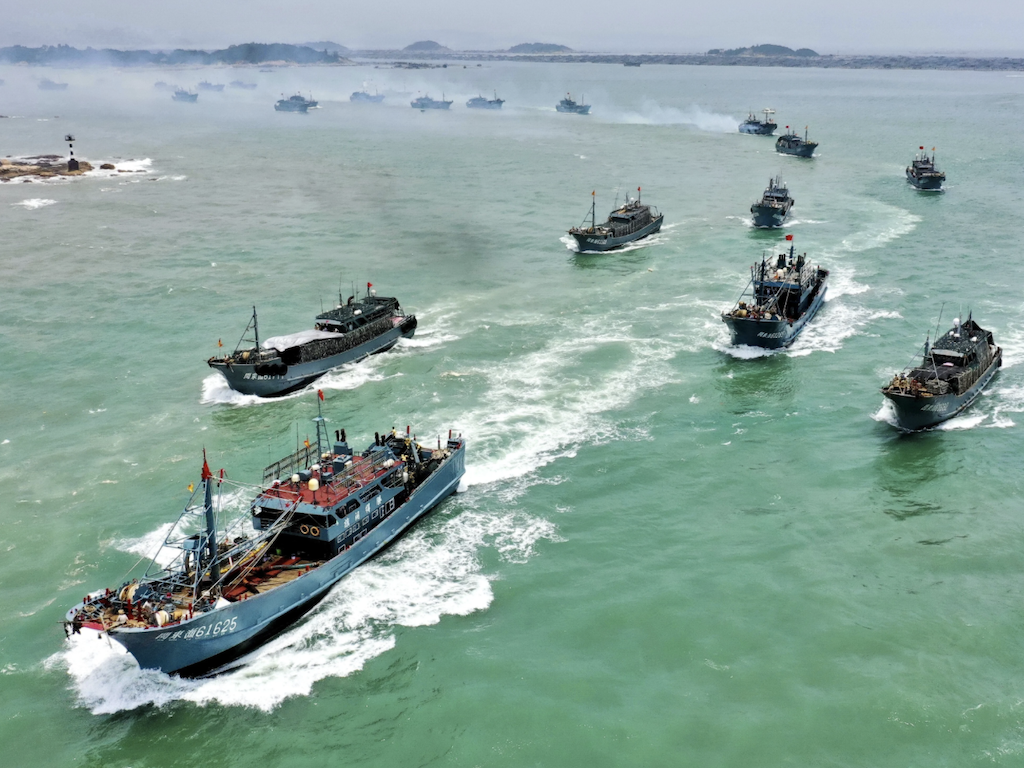3 Mins Read
Around 260 Chinese fishing fleets were recently detected in the seas surrounding the Galápagos islands off the coast of Ecuador. The vast armarda of fishing vessels in the biodiverse Pacific islands has raised alarm bells over the fishing practices that conservationists say could severely damage the region’s protected marine ecosystem.
In late July, the Ecuadorian navy warned that hundreds of Chinese fishing fleets have crossed the Pacific to reach the waters near the Galápagos Islands, which were declared a Unesco world heritage site since 1978 and protected for its unique biodiversity and wildlife.
While Chinese fishing fleets have been coming every year to the seas around the Galápagos to hunt for seafood, in particular for squid, this year’s marks the largest the navy has spotted in years.
The fleet includes fishing boats as well as refrigerated container ships known as “reefers” that store huge catches. Transhipments, or transferring cargo between ships which the reefers are for, is a legal practice, but it can be prohibited under international marine law under certain circumstances that include specific regional laws, what items are being transshipped and whether they have been reported to the relevant regulatory bodies within the mandated timeline.
Read more: How our insatiable demand for seafood is behind what’s happening in Galápagos
Last year, around 245 fishing vessels were discovered to be crossing the same waters around the Galápagos. In 2017, 6,000 silk, whale and hammerhead sharks were illegally caught by Chinese vessels, and were seized in a haul as the vessels crossed the protected waters of the Galápagos Islands.
While the squid fishing that the flagged Chinese vessels are engaging in is legal, conservationist groups have voiced concern that the fishing practices of these boats could lead to a collapse of the ocean’s ecosystem and harm protected and already extremely vulnerable species.
“We are watching the destruction of the ocean in real time,” said the ocean conservation organisation the Blue Planet Society.
The waters surrounding the Galápagos are home to the largest density of sharks in the world, including the endangered hammerhead shark and whale shark, as well as a diverse number of marine species that are also under threat from fishing. The archipelago has been described as a “living museum and a showcase for evolution” by Unesco and “a seedbed for life for the entire planet” by the Ecuadorian president Lenín Moreno.
Despite the fact that Ecuador has announced that China has agreed to supervision of their fishing fleets in the area, critics have pointed out that the Andean nation’s navy will likely struggle to carry out the monitoring necessary to prevent marine atrocities from happening.
The Chinese vessels are spread out over a sprawling area, and Ecuador does not have the legal power to prevent fishing in the international waters at the edge of Galápagos Exclusive Economic Zone, inhabited by many marine species that spill over from the protected site.
China’s distant-water fishing fleet is the largest in the world with almost 17,000 vessels in total – over 1,000 of which are registered in other countries. According to a report by the Overseas Development Institute, China’s fishing ships have been targeting the territorial waters of low-income countries after having depleted fish stocks in its domestic waters, fuelled by the unsustainable demand for seafood.
“This is not fishing any more, it is simply destroying the resources of our oceans,” Jonathan Green, co-founder and director of the Galápagos Whale Shark Project told the Guardian.
“We should ask whether any nation on this planet has the right to destroy what is common ground.”
Lead image courtesy of Xinhua.




